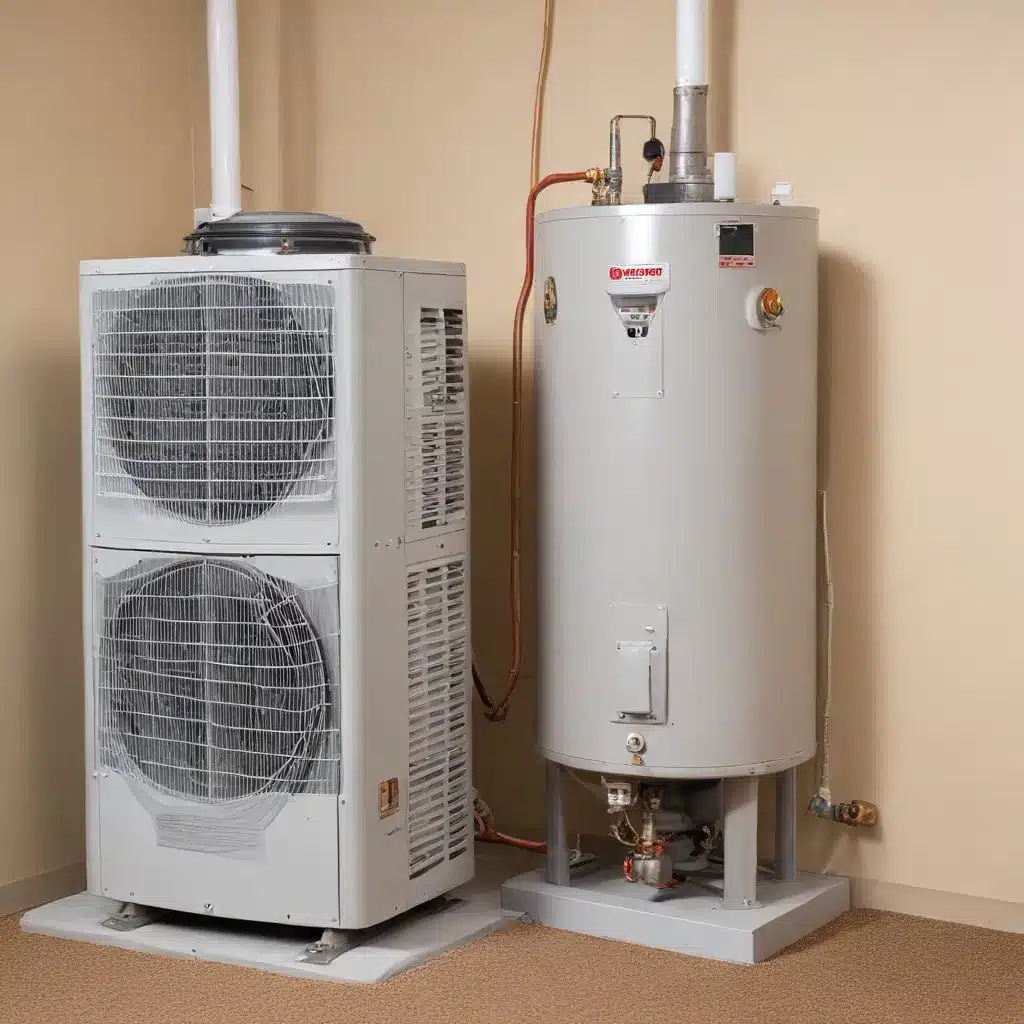
Understanding Heat Pump Water Heaters
Heat pump water heaters are becoming increasingly popular among homeowners, and for good reason. These innovative systems offer a highly energy-efficient alternative to traditional electric or gas-powered water heaters, helping to conserve both energy and water resources. As a seasoned expert in plumbing and heating services, I’m excited to share insights on this cutting-edge technology and how it can benefit your home.
At their core, heat pump water heaters work like a refrigerator in reverse. Instead of pulling heat from the inside of a box and dumping it into the surrounding room, they extract heat from the ambient air and transfer it to the water in the storage tank. This process can be up to three times more efficient than conventional electric water heaters, leading to significant savings on your utility bills.
One of the key advantages of heat pump water heaters is their ability to dehumidify the surrounding air as they operate. This can be particularly beneficial in humid climates, where excess moisture can contribute to mold, mildew, and other indoor air quality issues. By removing this moisture, heat pump water heaters can help create a healthier, more comfortable living environment.
Factors to Consider When Choosing a Heat Pump Water Heater
When it comes to selecting the right heat pump water heater for your home, there are several important factors to consider:
Climate and Installation Location
Heat pump water heaters require a specific operating environment to function at their best. They perform most efficiently in spaces that maintain a temperature range of 40°F to 90°F year-round and provide at least 1,000 cubic feet of surrounding air space. Ideal locations may include a garage, basement, or utility room, where the exhaust air can be vented without negatively impacting the home’s heating or cooling needs.
Sizing and Capacity
Selecting the appropriate size heat pump water heater is crucial for ensuring adequate hot water supply and optimal energy efficiency. The size is typically measured by the tank’s storage capacity, with common options ranging from 40 to 80 gallons. To determine the right size for your household, consider factors such as the number of occupants, frequency of use, and peak hot water demands.
Backup Heating Elements
Many heat pump water heaters are designed with integrated backup electric resistance heating elements. These elements provide an additional heat source when the heat pump alone cannot keep up with hot water demand, such as during periods of high usage or when the ambient air temperature drops. This hybrid design helps ensure a consistent supply of hot water while maintaining overall energy efficiency.
Maintenance and Upkeep
Proper installation and regular maintenance are essential for maintaining the efficiency and longevity of your heat pump water heater. This may include tasks such as cleaning the air filter, checking refrigerant levels, and ensuring the proper operation of all system components. Following the manufacturer’s recommendations and working with a qualified plumbing and heating contractor can help optimize the performance of your heat pump water heater.
The Benefits of Heat Pump Water Heaters
The advantages of transitioning to a heat pump water heater extend well beyond just energy savings. Let’s explore some of the key benefits:
Energy Efficiency and Cost Savings
By leveraging the heat from the surrounding air, heat pump water heaters can achieve energy efficiency rates of up to 300% compared to traditional electric water heaters. This translates to significant cost savings on your utility bills, with some homeowners reporting annual savings of more than $500 on their electricity costs.
Environmental Impact and Sustainability
The enhanced energy efficiency of heat pump water heaters directly contributes to a reduced carbon footprint and environmental impact. By consuming less electricity, these systems help lower greenhouse gas emissions and support broader sustainability efforts. This aligns with the growing demand for eco-friendly home solutions that minimize our reliance on fossil fuels.
Improved Indoor Air Quality
As mentioned earlier, the dehumidifying capabilities of heat pump water heaters can have a positive impact on indoor air quality. By removing excess moisture from the surrounding air, they can help prevent the growth of mold, mildew, and other allergens, creating a healthier living environment for occupants.
Versatility and Compatibility
Heat pump water heaters can be installed as standalone units or integrated into larger HVAC systems that provide both heating and cooling. This versatility allows homeowners to tailor the solution to their specific needs and existing infrastructure. Additionally, many models are compatible with smart home technologies, enabling remote monitoring and control for added convenience.
Transitioning to a Heat Pump Water Heater
If you’re considering upgrading your home’s water heating system, a heat pump water heater is a compelling option worth exploring. To get started, I recommend reaching out to a qualified plumbing and heating contractor who can assess your specific needs and provide personalized recommendations.
During the initial consultation, the contractor will evaluate factors such as your home’s size, hot water usage patterns, and the available installation space. They can then help you select the most suitable heat pump water heater model and guide you through the installation process, ensuring it’s done correctly and safely.
One of the best ways to take advantage of heat pump water heater technology is by exploring the various incentive programs and rebates available in your local area. For example, Efficiency Maine offers multiple ways for homeowners to save on the purchase and installation of qualifying units, including instant in-store discounts and mail-in rebates.
By investing in a heat pump water heater, you’ll not only enjoy the benefits of enhanced energy efficiency and cost savings but also contribute to a more sustainable future for your home and the environment. As an expert in plumbing and heating services, I’m confident that this technology can be a game-changer in your water heating and home comfort journey.


